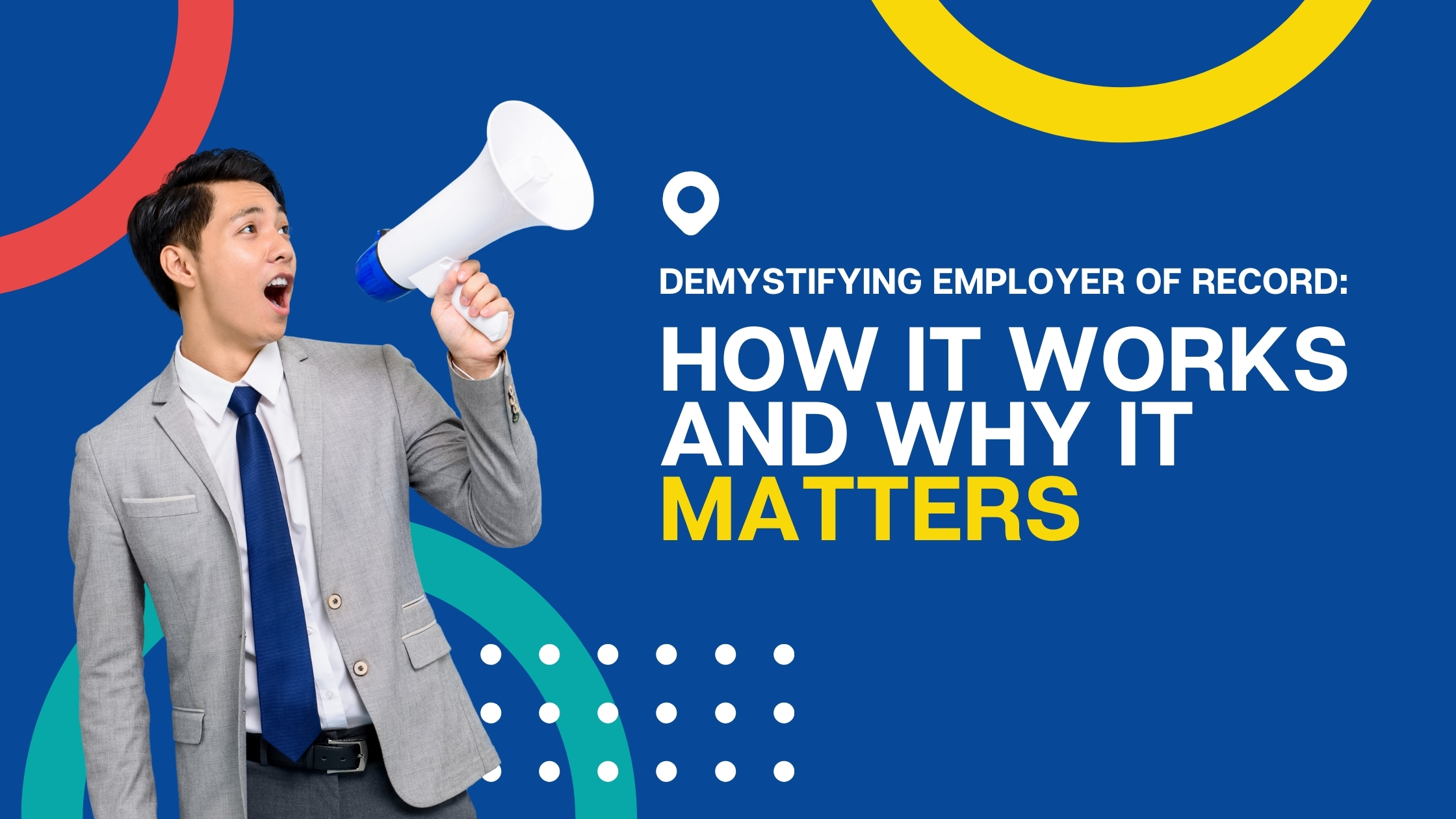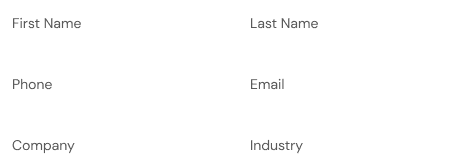
An Employer of Record (EOR) is your turn-key solution to expanding your business, enabling you to focus on core business operations while ensuring compliance with local labor laws and taxes. Simply put, the EOR becomes the legal employer of your workforce, handling the heavy-lifting in human resources, from payroll to compliance, so you don't have to.
This guide is to help you understand how an EOR works and how it’s the next step to scaling your business.
What is an Employer of Record (EOR)?
An Employer of Record(EOR) is a service that takes on the legal responsibilities of employment on behalf of another company. By doing so, they shoulder the burden of administrative functions, giving you the freedom to grow your business without the worry of managing HR and compliance.
- Purpose and Benefits of Using an EOR
EORs are a powerful partner, particularly for small to medium-sized businesses expanding into new markets without the infrastructure to support local employment. By using EOR services, you gain access to a global workforce while mitigating risks and headaches associated with non-compliance and other key administrative responsibilities while still having full control over your team.
- Overview of Key Functions and Responsibilities
EORs are like your knight in suit and tie. They manage the heavy-lifting of administrative tasks so that you aren't distracted by managing HR, compliances, payroll administration, etc. they help grow and expand your team, reduce costs and take your business to new heights.
Key Components of EOR Services
Payroll Management
- Processing Payroll
An EOR helps you keep things simple. Payroll administration is complicated, time-consuming and overall a headache for employers to manage and comply with. EORs process these for you, ensuring your employees are paid accurately and on time, taking on the burden of deducting compliances and taxes so you don't have to.
- Ensuring Compliance with Local Tax Laws
Tax laws vary across countries, making it challenging to account for in managing your growing business. An EOR is familiar with local tax laws and ensures compliance, which saves you time, money, and a lot of liability risks.
Employment Contracts
- Drafting and Managing Contracts
An EOR helps draft and manage employment contracts, making sure that all legal requirements are met. This includes ensuring that the contract is in compliance with local labor laws, outlining compensation, benefits, and any other necessary details.
- Compliance with Local Labor Laws
Labor laws differ across countries and can be complex. An EOR ensures that your employment contracts adhere to local regulations, protecting both you and your employees from potential legal consequences.
Benefits Administration
- Ensuring Employee Benefit Enrollment and Eligibility
EORs handle employee benefit administration, ensuring that your employees have access to the necessary benefits they are entitled to. This reduces the administrative burden on employers and ensures that all employees receive due benefits.
- Managing Benefits Administration
In addition to handling employee benefit enrollment, EORs also manage ongoing benefits administration. They ensure that any changes in coverage or other benefits-related issues are promptly communicated and handled, freeing up your time to focus on other aspects of your business.
- Compliance with Local Benefit Laws
Similar to tax and labor laws, benefit laws also vary across countries. An EOR stays up-to-date on these laws and ensures that your employee benefits packages are compliant and timely.
Human Resources Support
- Recruitment and Onboarding
EORs assist in recruiting new employees by posting job advertisements, screening resumes, conducting interviews, and performing background checks. They also handle the onboarding process, ensuring a quick and smooth hiring.
- Resolving Employee Disputes
In the event of employee disputes or grievances, an EOR can step in as a mediator to resolve them in compliance with local laws and regulations. This saves you time and resources as well as maintains a positive work environment for your team.
Legal and Regulatory Compliance
- Compliance with Local Laws and Regulations
EORs stay updated on local laws and regulations related to employment, taxes, and benefits. They ensure that your business is in compliance with these laws to avoid potential legal issues or penalties.
- Ensuring Proper Employee Classification
Misclassifying employees can result in costly legal consequences for businesses. EORs help ensure that all of your employees are properly classified according to local laws and regulations.
- Managing Payroll Taxes
EORs handle payroll tax management, including calculating and withholding employee taxes, filing tax returns, and making timely payments to tax authorities.
Risk Management
- Mitigating Risks in Employment Practices
EORs provide guidance and support to help businesses and employees mitigate risks associated with employment practices, such as discrimination, harassment, and wrongful termination. They can also assist in developing and implementing policies to prevent these issues.
- Managing Workers' Compensation
EORs handle workers' compensation insurance for your employees, ensuring compliance with local laws and regulations. In the event of a dispute in the wellness of the workplace or work environment, an EOR can also assist with filing and managing workers' compensation claims.
- Minimizing Employee Turnover
EORs can provide valuable insights and support in creating a positive work environment, implementing effective retention strategies, and addressing any issues that may lead to high employee turnover rates.
Advantages of Using an EOR
Compliance and Risk Management
- Expertise in Local Laws and Regulations
EORs have background knowledge and experience in managing local labor laws. This ensures that your business remains compliant with all employment laws, reducing the risk of potential legal issues or penalties.
- Reduced Administrative Burden
Partnering with an EOR can help lift the administrative burden of managing payroll, taxes, benefits, and other HR tasks. This allows businesses to focus on their core operations and growth strategies.
- Mitigated Risks in Employment Practices
As mentioned before, EORs provide guidance and support to help mitigate risks associated with employment practices. This not only protects your business from potential legal consequences but also helps maintain a positive work environment
Time and Cost Savings
- Streamlined Onboarding Process
EORs have established processes for onboarding new employees, which can save time and resources for businesses hiring new talent.
- Access to Benefits and Insurance Plans
EORs often offer access to competitive benefits and insurance plans, which may not be available for small businesses to provide on their own. This allows businesses to attract and retain top talent without incurring having to put in the effort.
- Efficient Payroll Management
Partnering with an EOR means that payroll processing is taken care of by experts, ensuring timely and accurate payment of wages, taxes, and benefits.
Focus on Core Business Activities
- Outsourcing Non-Core Functions
Partnering with an EOR allows businesses to outsource non-core functions such as HR, payroll, and benefits administration. This frees up time and resources for businesses to focus on their core priorities.
- Scalability
EORs are equipped to handle fluctuations in workforce needs, allowing businesses to scale quickly without the hassle of hiring or laying off employees.
Challenges and Considerations
Selecting the Right EOR Provider
- Assessing Company Needs
Before selecting an EOR provider, businesses should assess their specific needs and consider which services the EOR offers. This will ensure that businesses are getting the most value and return out of their investment.
- Credibility
It’s important for you to research the credibility and reputation of potential EOR services. This can be done by reading reviews, speaking with current clients, checking credentials and compliance records.
- Understanding Contract Terms and Fees
Businesses should carefully review EOR contracts and fees to ensure they understand the terms and any potential additional costs before signing an agreement. It's also important to clarify expectations for services provided and timeline for implementation.
Managing Communication and Expectations
- Setting Clear Expectations
To ensure a successful partnership, it's important for businesses to communicate their expectations clearly and regularly with partnering EOR services. This includes discussing goals, timelines, and any concerns or changes in business needs or circumstances.
- Maintaining Communication
Open communication between the business and EOR provider is key to addressing any issues or challenges that may arise. Businesses and EORs should establish regular check-ins to discuss progress and address any concerns.
Integration with Existing Systems
- Compatibility with Existing Systems
Before selecting an EOR provider, businesses should consider the compatibility of their existing systems and processes with the EOR's. This will help ensure a smooth integration and minimize any trouble to business operations.
- Managing Data Security
Businesses must also consider data security when integrating with an EOR provider. This includes discussing protocols for handling sensitive employee information and ensuring appropriate measures are in place to protect data.
FAQs
A. How can I benefit from using an EOR?
Using an EOR can bring many benefits to your business. It allows you to expand into new markets without the need for setting up legal entities, hiring local HR staff, or navigating complex employment laws. EOR services can help streamline your HR processes and reduce administrative burden, freeing up time and resources for other important business functions.
B. How do I choose the right EOR provider?
Choosing the right EOR provider requires careful research and evaluation. Consider factors such as their experience in your target market, their track record of compliance with local laws and regulations, their communication style and capabilities, and their compatibility with your business goals and values.
C. Can I still have control over my employees if I use an EOR?
Yes, you can still maintain control over your employees even if you partner with an EOR. This can be achieved through effective communication and setting clear expectations for your employees in collaboration with the EOR provider.
D. What types of services do EORs typically offer?
EORs can offer a variety of services depending on your business needs and the country or region you are expanding into. Some common services include payroll management, benefits administration, tax compliance, work permit processing, employee onboarding and offboarding, and legal support for employment-related matters. Many EORs also offer consultation and advisory services to help your business navigate different cultural norms and laws in the target market.
The Next Step
Ultimately, partnering with an EOR can offer a valuable solution for businesses looking to expand internationally or streamline HR processes. With careful evaluation and assessment, businesses can effectively use EOR services to grow their potential while staying compliant with local laws and regulations.
This allows you to thrive and adapt in an evolving business landscape, making EORs your next level partner to innovative success.
Jump straight to a key chapter
Spending Too
Much Time
Onboarding?
your remote hiring in the
Philippines, excellently.
Say Goodbye to High Costs!
Request Your Free Consultation Today andSave a Massive 70% on Your Workforce!

Ready to thrive in a remote-first work environment?


